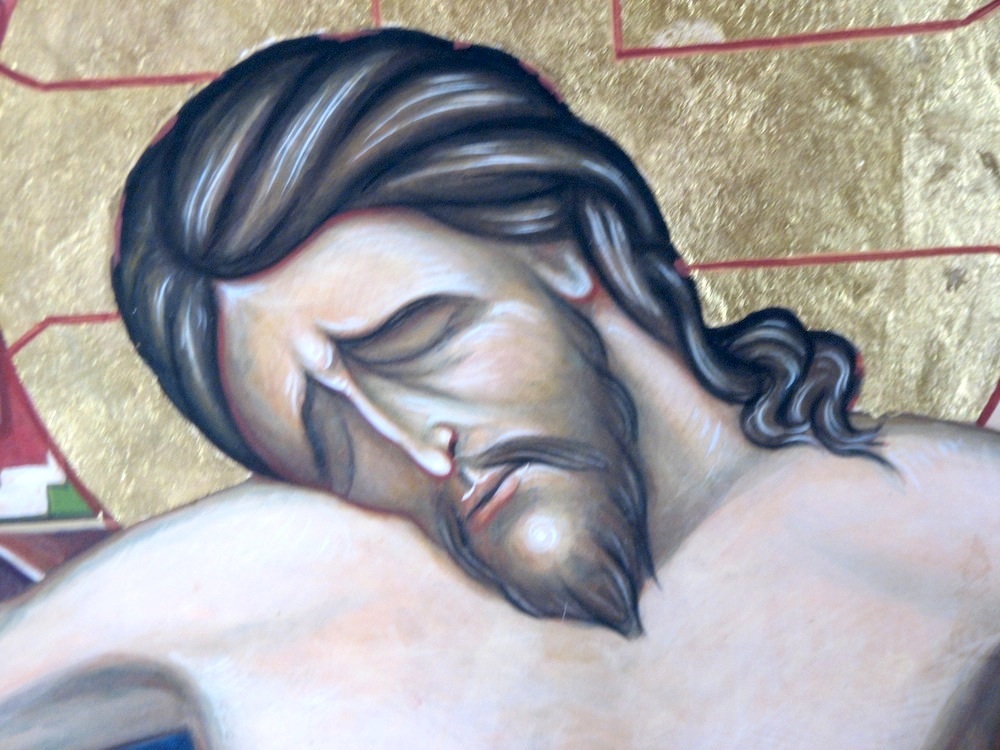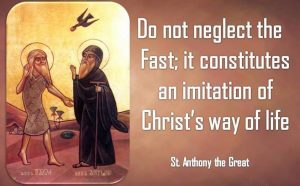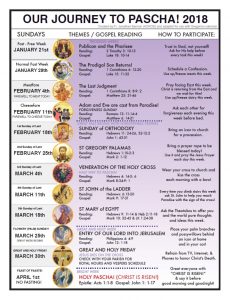 The Church sets aside the next forty days as a period of prayer and penance as a preparation for the Great and Holy Week and the resurrection of our Lord. There are rules about fasting, which we must observe as faithful Christians. However, we must not mistake the true meaning of the Fast. The fast is, truly, a period of spiritual ascesis (struggle), as today’s Gospel tells, us, “Do not store up for yourselves treasures on earth … But store up treasures in heaven” (Matthew 6:19-20). However, it is not like school, where we keep all the class rules and earn gold stars for our obedience. Today’s epistle tells us that the Fast is not about “keeping rules:” “The one who eats must not despise the one who abstains, and the one who abstains must not pass judgment on the one who eats; for God has welcomed him” (Romans 14:3). Yes, we do keep the rules, but we must also transcend the rules.
The Church sets aside the next forty days as a period of prayer and penance as a preparation for the Great and Holy Week and the resurrection of our Lord. There are rules about fasting, which we must observe as faithful Christians. However, we must not mistake the true meaning of the Fast. The fast is, truly, a period of spiritual ascesis (struggle), as today’s Gospel tells, us, “Do not store up for yourselves treasures on earth … But store up treasures in heaven” (Matthew 6:19-20). However, it is not like school, where we keep all the class rules and earn gold stars for our obedience. Today’s epistle tells us that the Fast is not about “keeping rules:” “The one who eats must not despise the one who abstains, and the one who abstains must not pass judgment on the one who eats; for God has welcomed him” (Romans 14:3). Yes, we do keep the rules, but we must also transcend the rules.
The Great Fast is not a period of earning merit points, which leads to pride anyway, but it is a time for a spiritual revolution in our lives. We must turn the values of the world: love for power, love of money, love of pleasure, and self-serving upside down. In our baptism, we promised to renounce “Satan, and all his works, and all his angels and all his service, and all his pride,” and to commit ourselves to Christ. This is especially true in a world which polarizes us into self-righteousness and teaches us hatred for the other. Why, indeed, do we fast? It is to bring about this revolution, foretold by Mary, the Mother of God, “[God] has thrown down the rulers from their thrones but lifted up the lowly. The hungry he has filled with good things; the rich he has sent away empty” Luke 1:52-53).
We must become the humble, the lowly, the hungry and reject the world’s lust for power. In the Great Fast, then, we live out the Lord’s Prayer: “Thy Kingdom come, thy will be done on earth as it is in heaven,” not our own plan for salvation, but God’s plan, God’s will, seen in love for the other, “Give us this day our daily bread,” for we fast from the delightful food of this world, to receive only Christ, who said, “I am the bread of life (John 6:48);” “forgive us our trespasses, as we forgive those who trespass against us,” in unconditional forgiveness, as today’s Gospel reveals, “If you forgive others their transgressions, your heavenly Father will forgive you. But if you do not forgive others, neither will your Father forgive your transgressions (Matthew 6:14-15), and finally, “lead us not into temptation, but deliver us from evil,” for if in the Fast we imitate Jesus, who fasted in the desert for forty days to overcome temptation, then we too will be delivered from evil, but not by our own proud struggles, but by the grace of God. In this fast, we must open ourselves to Christ, who said, “Behold, I make all things new” (Revelation 21:5).
 Archpriest David Petras reviews some hallmarks of the liturgical observance and prayer.
Archpriest David Petras reviews some hallmarks of the liturgical observance and prayer.